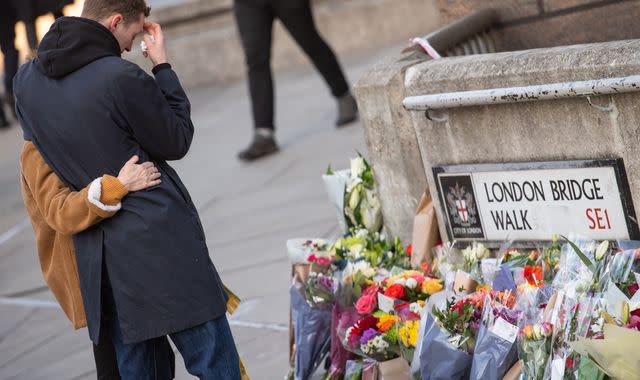Fishmongers' Hall: Intelligence warned killer might attack on release - but it wasn't widely circulated, inquest told

Intelligence warned the Fishmongers' Hall killer might launch an attack on his release from prison - but it was not shared with his probation officer, an inquest has heard.
Usman Khan was handed an indeterminate sentence in 2012 for plotting a terror training camp in Pakistan, although the sentence was varied to eight years in custody on appeal, and meant he no longer needed the approval of the Parole Board to be released.
Eleven months after he left prison, Khan killed Cambridge University graduates Jack Merritt, 25, and Saskia Jones, 23, at a prisoner education event he had been invited to at Fishmongers' Hall in London in November 2019.
Wearing a fake suicide vest, Khan was shot dead by armed police on London Bridge, 13 minutes after the attack began.
He had been released from Whitemoor Category A prison as a "high risk" terrorism offender after serving half of a 16-year sentence and was living in Stafford.
The inquest into Mr Merritt and Ms Jones' deaths was told that MI5 had intelligence that Khan "intends to carry out an attack after his release" and that he had expressed "hatred for the UK" a year before.
The intelligence had come from the Prison Service - but was not included on MI5's intelligence system, the inquest was told.
According to Special Branch notes from November 2018, a month before his release, the reason for it not being included was "due to strict handling conditions".
Det Sgt Jon Stephenson was managing the MI5 investigation into Khan for Staffordshire Special Branch, code named Operation Malal.
He spoke to DI Robert Hessell, the head of the operational intelligence management unit at Special Branch, about "breaking out" the intelligence report.
But the senior officer explained to the inquest: "Effectively, the handling conditions precluded that from being shared more widely."
The "appropriate level" was said to be "really only of note" for Staffordshire Special Branch and the West Midlands Counter-Terrorism Unit, which meant it could not be shared with Khan's probation officer or with 'Prevent' de-radicalisation officers who were conducting regular checks on Khan.
However, DI Hessell did raise concerns that Khan was going to participate in a course to learn to drive a dumper truck, telling the inquest he was "surprised" at the proposal.
"It was well known over the preceding years the number of attacks that had taken place as vehicle borne attacks. I thought that would be naive."
He got a counter-terrorism security adviser to send information from MI5's Joint Terrorism Analysis Centre (JTAC) to the Prevent team.
Despite objections from Ken Skelton, Khan's probation officer and Sgt Calum Forsyth, Khan's Prevent officer, the course was "put on hold".
Before Khan's release, DI Hessell's pocket book recorded that Khan was a "radicaliser of others" and "expressed extremist views" while in prison, adding: "Holds shariah court."
Beneath that he had recorded the two "official sensitive" strands of intelligence: "Will return to old ways" and "intends to carry out an attack."
Detective Chief Superintendent Javid Oomer also told the hearing he wrongly thought Khan had been released by the parole board and that he had been de-radicalised.
He further admitted he did not object to Staffordshire Police's inexperienced Prevent offices taking on the responsibility for monitoring 28-year-old Khan upon his release from prison.
In his evidence, Mr Oomer said it was a "poor choice of words" to have described Khan as having been de-radicalised.
Henry Ptichers QC, representing the family of Ms Jones, said Mr Oomer could not have concluded that Khan had been de-radicalised.
Mr Pitchers said: "That was a mistake on your part."
Mr Oomer replied: "Yes."
Mr Oomer admitted to Nick Armstrong, representing Mr Merritt's family, that he had previously thought Khan had "passed through parole".
Mr Armstrong said: "You realise that is profoundly wrong?"
Mr Oomer replied: "Yes."
Initially Khan was monitored, using visits by the Prevent team to make sure he complied with his licence conditions, and by mentors, designed to help him get back into work and reengage with society.
They also had GPS tagging data, from an ankle bracelet that showed Khan took walks by the River Sow in Stafford and to Asda, but almost nowhere else.
DI Hessell said: "I think all the information was that he was complying with his conditions. The tag data was unremarkable, he didn't move much outside the area."
The Prevent officers were "suggesting he was reformed, had put past behind him and wanted to be a mentor and go through the rehabilitation process".
But DI Hessell found there was frustration from a junior officer that she could not speak directly to Khan's probation officer and had to go through the Prevent officers.
DC Emma Harthill complained that Prevent were not recording "lots of valuable info" on Khan's "mindset" and had "not put much thought into" how they were going to manage him.

 Yahoo News
Yahoo News 
